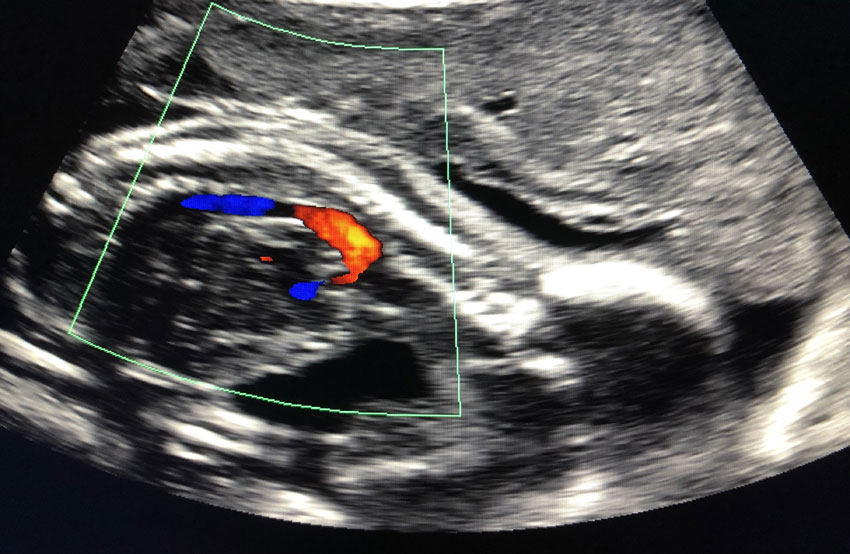Fetal Cardiology
- 𝗛𝗼𝗽𝗲 𝗪𝗼𝗺𝗲𝗻'𝘀 𝗛𝗼𝘀𝗽𝗶𝘁𝗮𝗹
- Fetal Cardiology

MON-SAT 8:00-9:00
+9199099 01123

Fetal Cardiology Services at HOPE Women’s Hospital
Fetal cardiology is a specialized field of medicine that focuses on diagnosing and managing heart conditions in unborn babies (fetuses). Fetal cardiologists use advanced imaging techniques and diagnostic tools to assess fetal heart health, detect cardiac abnormalities, and provide early intervention and treatment when necessary. At HOPE Women’s Hospital, we offer comprehensive fetal cardiology services to monitor and evaluate fetal heart development, detect congenital heart defects, and provide personalized care for expectant parents and their babies.Understanding Fetal Cardiology
Fetal cardiology involves:
- Fetal Heart Assessment: Using ultrasound, fetal echocardiography, and other imaging techniques to evaluate fetal heart structure, function, and blood flow patterns.
- Cardiac Anomaly Detection: Detecting and diagnosing congenital heart defects, structural abnormalities, rhythm disorders, and other cardiac conditions in the fetus.
- Risk Assessment: Assessing the severity of cardiac anomalies, understanding the impact on fetal well-being, and providing risk stratification for treatment planning.
- Early Intervention: Offering timely medical interventions, treatment strategies, and management plans to optimize fetal heart health and outcomes.
- Family Counseling: Providing education, counseling, and support for expectant parents to understand fetal heart conditions, make informed decisions, and prepare for postnatal care.
Types of Fetal Cardiology Services
- Fetal Echocardiography: This specialized ultrasound technique focuses on imaging the fetal heart in detail, assessing cardiac structures, function, and blood flow patterns.
- Doppler Ultrasound: Doppler imaging measures blood flow velocity and direction in fetal blood vessels, helping evaluate cardiac function and detect abnormalities.
- Fetal Electrocardiography (ECG): Fetal ECG monitors electrical activity in the fetal heart, detecting rhythm abnormalities or conduction disorders.
- Genetic Testing: Genetic tests such as amniocentesis or chorionic villus sampling (CVS) may be performed to assess genetic causes of congenital heart defects or syndromes.
- Prenatal Counseling: Educating expectant parents about fetal heart conditions, treatment options, potential outcomes, and postnatal care planning.
- Collaborative Care: Working closely with obstetricians, perinatologists, neonatologists, pediatric cardiologists, and other specialists to provide comprehensive care for the baby and family.
Indications for Fetal Cardiology Evaluation
- Fetal cardiology evaluation may be recommended based on:
- Abnormal Ultrasound Findings: Routine prenatal ultrasound may reveal suspected cardiac abnormalities or structural defects in the fetus.
- Maternal Health Conditions: Maternal conditions such as diabetes, lupus, or connective tissue disorders may increase the risk of fetal heart problems.
- Family History: A family history of congenital heart defects, genetic syndromes, or cardiac abnormalities may warrant fetal cardiology evaluation.
- Previous Pregnancy Complications: Individuals with a history of pregnancies affected by congenital heart defects or cardiac issues may benefit from fetal cardiology assessment.
- Abnormal Fetal Heart Rate: Irregular fetal heart rhythms, bradycardia (slow heart rate), or tachycardia (fast heart rate) detected during prenatal monitoring.
- Suspected Syndromes or Genetic Disorders: Genetic testing results indicating potential syndromes or genetic conditions associated with cardiac anomalies.
Benefits of Fetal Cardiology Evaluation
Early Detection: Fetal cardiology evaluation allows for early detection of congenital heart defects, rhythm abnormalities, and structural anomalies in the fetus.
Accurate Diagnosis: Specialized imaging and diagnostic tools provide accurate diagnosis of fetal heart conditions, guiding treatment and management decisions.
Treatment Planning: Fetal cardiology assessment helps develop personalized treatment plans, medical interventions, and monitoring strategies for optimal fetal heart health.
Emotional Support: Fetal cardiology services offer emotional support, counseling, and education for expectant parents facing fetal heart conditions and potential challenges.
Improved Outcomes: Early intervention, treatment, and specialized care contribute to improved outcomes for babies with congenital heart defects and cardiac issues.
Family Preparation: Expectant parents can prepare emotionally, mentally, and practically for the birth of a baby with cardiac needs, coordinating with healthcare teams and support services.
Our Fetal Cardiology Team
At HOPE Women's Hospital, our fetal cardiology team includes experienced fetal cardiologists, sonographers, genetic counselors, and support staff dedicated to:
Advanced Imaging: Utilizing state-of-the-art ultrasound equipment and imaging techniques for detailed fetal heart assessment.
Diagnostic Expertise:Interpreting fetal echocardiograms, Doppler studies, and other diagnostic tests to diagnose and understand fetal heart conditions.
Multidisciplinary Collaboration: Working collaboratively with obstetricians, perinatologists, neonatologists, pediatric cardiologists, and other specialists for comprehensive care.
Patient-Centered Care: Providing compassionate, patient-centered care with a focus on education, counseling, and family support throughout the evaluation process.
Continuity of Care: Ensuring seamless continuity of care from prenatal diagnosis and treatment planning to postnatal follow-up and pediatric cardiology services.

GET APPOINTMENT
Schedule Your Consultation
APPOINTMENT
If you have questions or concerns about fetal heart health, congenital heart defects, or cardiac abnormalities in the fetus, schedule a consultation with our fetal cardiology team at HOPE Women's Hospital. We are committed to providing you and your baby with expert evaluation, personalized care, and support to ensure the best possible outcomes.

